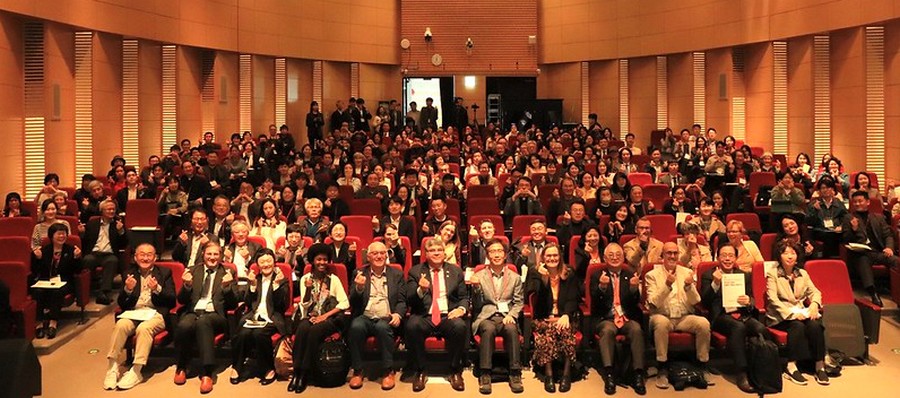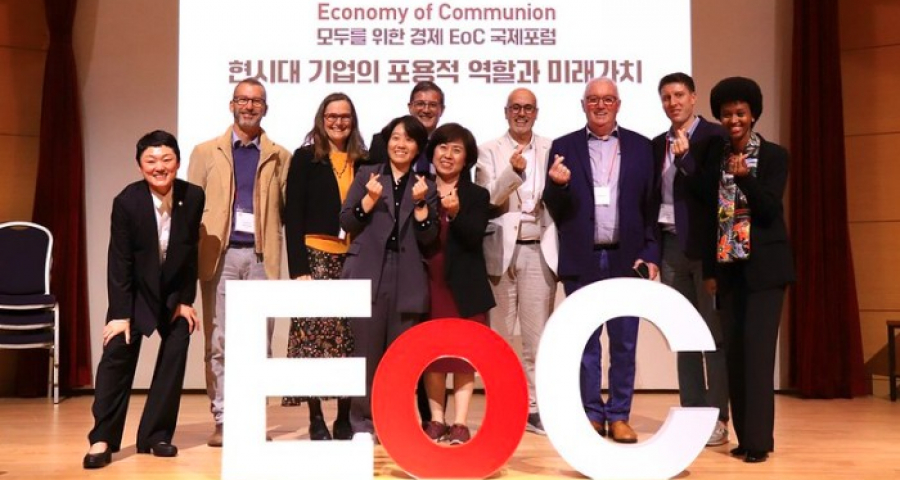The national forum of the Economy of Communion in South Korea was held on 30 October in Daejeon: an opportunity to discover the EoC experience in this corner of the world
by Francesco Tortorella
It is a mild autumn morning in the streets of the exhibitions district in Daejeon. The air is cool and the sun warms the skin, before the cold autumn currents arrive. The season of the changing of colours has already begun: the Asian country is well-known for its beauty. Here, too, even amidst the skyscrapers and ultra-modern buildings of this city in the centre of the country, these days shades of green, yellow, orange and red alternate as the colours of the leaves on the trees. It is this image of diversity and beauty to welcome around two hundred people to Daejeon Convention Center on Wednesday 30 October to attend the national forum of the Economia di Comunione della Corea del Sud (Economy of Communion South Korea) entitled:
‘The inclusive role of today's businesses for a sustainable future'.
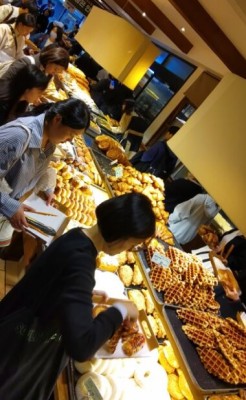 Greeting us at the entrance to the convention centre is one of the headquarters of the restaurant, bakery and confectionery chain “Sung Sim Dang”, a company founded in 1956 that has been a member of the EoC for more than 20 years and has made this city so famous for its bread and pastries. Today it has several outlets and restaurants scattered around the city and it is not by accident that the annual bread festival also takes place in Daejeon, with people coming here precisely to taste Sung Sim Dang's baked goods.
Greeting us at the entrance to the convention centre is one of the headquarters of the restaurant, bakery and confectionery chain “Sung Sim Dang”, a company founded in 1956 that has been a member of the EoC for more than 20 years and has made this city so famous for its bread and pastries. Today it has several outlets and restaurants scattered around the city and it is not by accident that the annual bread festival also takes place in Daejeon, with people coming here precisely to taste Sung Sim Dang's baked goods.
The forum is an opportunity to present the international experience of the economy of communion to those in Korea today who want to learn about it, in the light of the increasingly pressing challenges of social justice and the climate change in this part of the planet. To open the discussion, there were two keynote speeches: Professor Anouk Grevin talked about the inclusive role that companies can play in today's economy, and Professor Hong Jong-ho about the present and future of Korean companies in the era of the climate crisis. These were followed by experiences of communion in the economy from Argentina, Spain, Burundi and, most importantly, Korea: the forum was a great opportunity to show how this experience is being put into practice here.
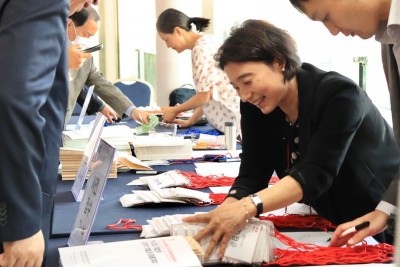 There are about ten Korean companies that are now members of the EoC, and were participating in the forum: we met them there together with journalists, scholars, students, workers and entrepreneurs, as well as some representatives of institutions and people interested in learning about the economy of communion. There is a company that produces aluminium components for the electric car industry, a high-tech IT company, a pharmacy, a number of accounting and architectural consulting firms, a publishing house, and several companies in the arts and culture, which would like not only to live their business activities in the style of the economy of communion, but also to offer goods and services that contribute to social cohesion and integration in their respective areas. One of these companies, for example, carries out cultural campaigns to disseminate the most beautiful love stories experienced by people of advanced age, to help them assume a more important role in a social fabric that places a lot of emphasis on working activity, risking marginalising, in some way, those who are no longer of working age. Another company, on the other hand, dedicates a particular programme to facilitating the re-employment of those women who interrupted their professional activity at the time of their pregnancy and were then unable to resume it; and another programme focuses on the labour inclusion of people with migration histories.
There are about ten Korean companies that are now members of the EoC, and were participating in the forum: we met them there together with journalists, scholars, students, workers and entrepreneurs, as well as some representatives of institutions and people interested in learning about the economy of communion. There is a company that produces aluminium components for the electric car industry, a high-tech IT company, a pharmacy, a number of accounting and architectural consulting firms, a publishing house, and several companies in the arts and culture, which would like not only to live their business activities in the style of the economy of communion, but also to offer goods and services that contribute to social cohesion and integration in their respective areas. One of these companies, for example, carries out cultural campaigns to disseminate the most beautiful love stories experienced by people of advanced age, to help them assume a more important role in a social fabric that places a lot of emphasis on working activity, risking marginalising, in some way, those who are no longer of working age. Another company, on the other hand, dedicates a particular programme to facilitating the re-employment of those women who interrupted their professional activity at the time of their pregnancy and were then unable to resume it; and another programme focuses on the labour inclusion of people with migration histories.
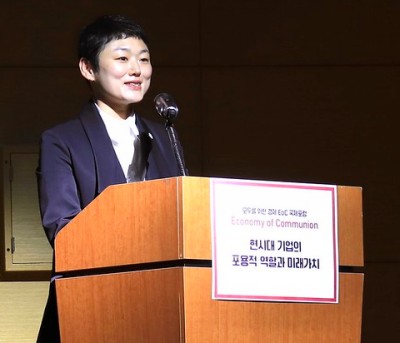 What is striking is the commitment with which these companies try to live the EoC through the full and explicit involvement of the workers in the practice of gestures of communion in the company and in their sharing. Sung Sim Dang, for example, with its more than 1,200 employees, publishes an internal newsletter every week and an entire book once a year, which gather together experiences of communion lived by the workers: a practice that has contributed to creating a genuine corporate culture. One worker, after participating in the forum, recounted:
What is striking is the commitment with which these companies try to live the EoC through the full and explicit involvement of the workers in the practice of gestures of communion in the company and in their sharing. Sung Sim Dang, for example, with its more than 1,200 employees, publishes an internal newsletter every week and an entire book once a year, which gather together experiences of communion lived by the workers: a practice that has contributed to creating a genuine corporate culture. One worker, after participating in the forum, recounted:
‘I have worked here for nineteen years, I was young and shortly after I started my daughter was born. My superiors always talked to me about the economy of communion, and I understood that this culture called me to generosity, to being interested in others, to giving something of myself to my colleagues, customers, suppliers’. She went on:
‘Listening to the experiences recounted at the forum today, however, it seems to me that I have understood something deeper about what the economy of communion means in business: I now understand that it has to do with reciprocity, that it is not just giving, but it is the experience of giving and receiving together that realises communion. As I reflected on these things I looked at my now grown-up daughter, who was next to me at the forum. And I was moved to see her there, with me, surrounded by this big family that saw her being born’.
The Korean EoC has a very active group of scholars and academics as well as a lively group of young entrepreneurs between the ages of 30 and 40 who discuss their vocation for entrepreneurship in communion every month. But that’s not all. The EoC community in Korea has been looking for its own ways to contribute to the mission of transforming poverty, and has found several: in addition to sharing corporate profits with the international EoC network for people in need and for training in the culture of giving, in recent years Korean EoC companies have dedicated themselves to closely supporting assistance and development interventions in Myanmar - such as supporting people who have been internally displaced due to armed conflict or supporting small business activities, in cooperation with AMU - and to start a labour and social inclusion programme for homeless people right in Seoul: the so-called “programma del buon vicino” (‘Good Neighbour Programme’). 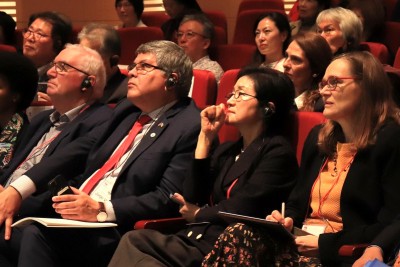 Thanks to the profits of some EoC companies and donations from other companies involved, some fifteen homeless people have now the opportunity to work in flower home delivery, in cooperation with various floral retailers. In this way, they are introduced to the world of work, and they receive compensation that allows them to pay for a smaller accommodation and begin to cultivate a greater confidence in their own abilities, thus making the first steps towards a more autonomous and dignified life. It is a rather significant impact of the EoC in a hyper-technological society where poverty is hardly ‘seen’ but does exists.
Thanks to the profits of some EoC companies and donations from other companies involved, some fifteen homeless people have now the opportunity to work in flower home delivery, in cooperation with various floral retailers. In this way, they are introduced to the world of work, and they receive compensation that allows them to pay for a smaller accommodation and begin to cultivate a greater confidence in their own abilities, thus making the first steps towards a more autonomous and dignified life. It is a rather significant impact of the EoC in a hyper-technological society where poverty is hardly ‘seen’ but does exists.
This experience has, in fact, aroused the desire to do something similar in other cities around the country. An employee of an EoC company in Daejeon, tells us:
‘In our company, the spirit of the economy of communion has been passed on to us and we try to live it in the workplace. Listening to the experience of the ‘Good Neighbour Programme’ at the forum, I felt the desire to do something more to spread this spirit in society and I immediately started thinking how we employees could replicate this programme here in our city.’
Leadership and the spirit of initiative of the workers of these companies is one of the fruits of the courage and enthusiasm with which the Korean EoC community tries to live communion in the economy: a message of hope and trust that rises like the sun in the morning in this corner of the world.
Find out more at: www.eockorea.com (in Korean)
